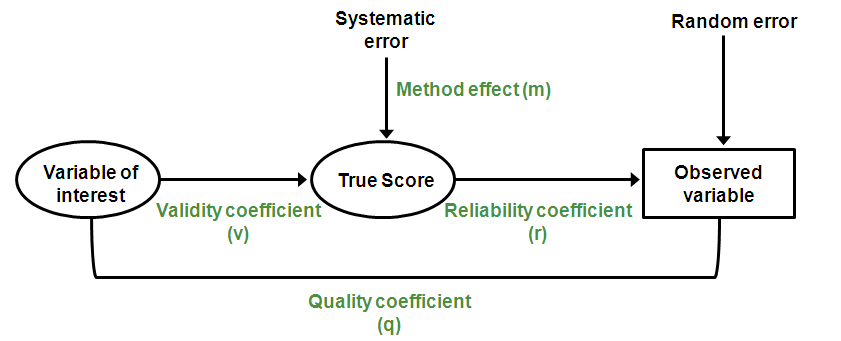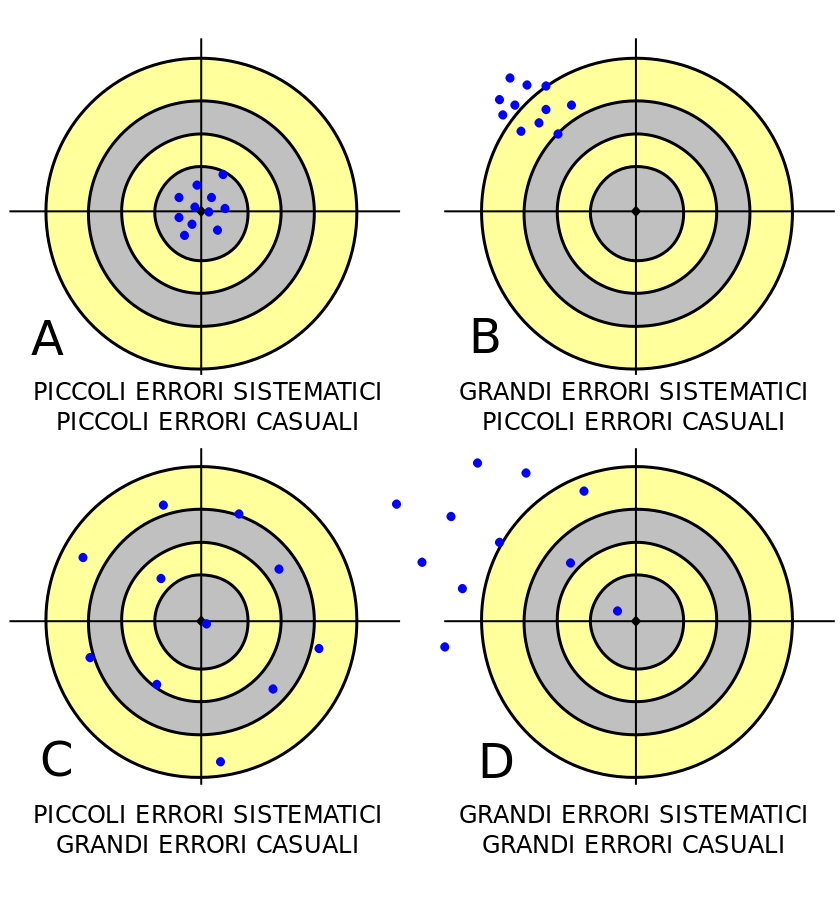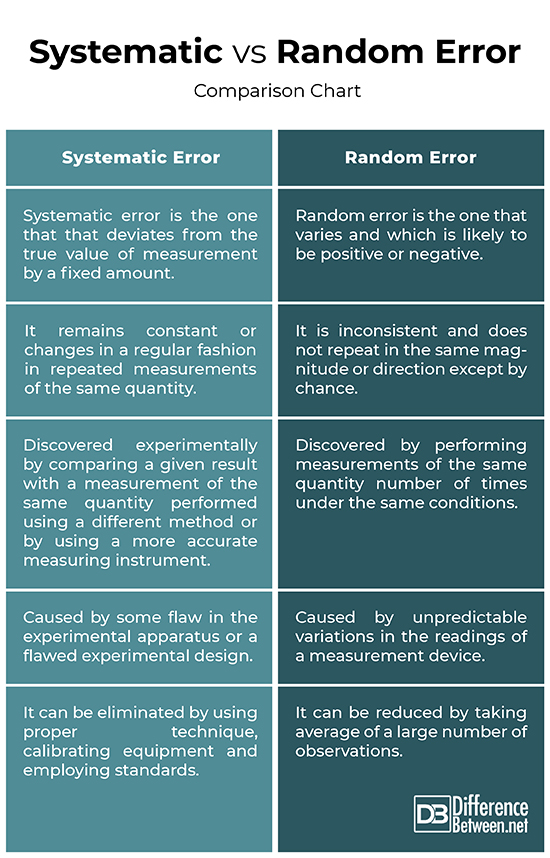Difference Between Systematic Error and Random Error
While measuring a physical quantity, we do not expect the value obtained to be the exact true value. It is important to give some sort of indication of how close the result is likely to be the true value, that is to say, some indication of the precision of reliability of the measurements. In physics, we do this by including an estimate of the error along with the result value. When analyzing the results, it is important to consider the sources of error and how these sources affected the results. The errors and uncertainty of measurements are always estimated in an indirect way and the calculations include some assumptions. Errors may be divided into two primary kinds, systematic and random errors. A systematic error is the one that remains constant or changes in a regular fashion in repeated measurements of one and the same quantity. On the contrary, a random error is the one that varies and which is likely to be positive or negative. Let’s take a look at some key differences between the two.

What is Systematic Error?
Systematic error is the one that occurs in the same direction each time and it remains constant or changes in a regular fashion in repeated measurements of one and the same quantity. A systematic error remains constant throughout a set of readings and causes the measured quantity to be shifted away from the accepted or predicted value. Systematic errors occur because the experimental arrangement is different from that assumed in the theory and the correction factor which takes account of this difference is ignored. In many cases, such errors are caused by some flaw in the experimental apparatus. Systematic error can be eliminated by using proper technique, calibrating equipment and employing standards.

What is Random Error?
As its name implies, random error is the one that varies in a random manner and which is produced by unpredictable and unknown variations in the total experimental process. Any type of error that is inconsistent and does not repeat in the same magnitude or direction except by chance is considered to be a random error. Gulliksen defines random error in a statistical sense in terms of the mean error, the correlation between the error and the true score, and correlation between errors being zero. For example, wind speed may drop and pick up at different points in time resulting in variations in the results. Random error is discovered by performing measurements of same quantity repeatedly under the same conditions.
Difference between Systematic and Random Error
Meaning of Systematic vs. Random Error
Errors can be divided into two primary kinds, systematic and random errors. Systematic error, as the name implies, is a consistent, repeatable error that deviates from the true value of measurement by a fixed amount. Systematic error is the one that occurs in the same direction each time due to the fault of the measuring device. On the contrary, any type of error that is inconsistent and does not repeat in the same magnitude or direction except by chance is considered to be a random error. Random errors are sometimes called statistical errors.
Nature of Systematic vs. Random Error
Random errors are discovered by performing measurements of the same quantity number of times under the same conditions and they involve the variability inherent in the natural world and in making any measurement. Systematic errors, on the other hand, can be discovered experimentally by comparing a given result with a measurement of the same quantity performed using a different method or by using a more accurate measuring instrument. Systematic errors give results that are either consistently above the true value or consistently below the true value.
Cause of Systematic vs. Random Error
Systematic errors are consistent and are caused by some flaw in the experimental apparatus or a flawed experimental design. Such errors are caused by faulty measuring devices that are either used incorrectly by individuals while taking the measurement or instruments that are imperfectly calibrated. Systematic errors are believed to be more dangerous than random errors. Random errors, on the other hand, are caused by unpredictable variations in the readings of a measurement device or by an observer’s inability to interpret the instrumental reading.
Elimination
Systematic errors can be eliminated by using proper technique, calibrating equipment and employing standards. Systematic errors are usually produced by faulty human interpretations or changes in environment during the experiments, which are difficult to eliminate completely. Repeated measurements with the same instrument neither reveal nor do they eliminate a systematic error. In principal, all systematic errors can be eliminated, but there will always remain some random errors in any measurement. Random errors, however, can be reduced by taking average of a large number of observations.
Systematic vs. Random Error: Comparison Chart

Summary of Systematic vs. Random Error
In principal, all systematic errors can be eliminated, but there will always remain some random errors in any measurement. Random errors, however, can be reduced by taking average of a large number of observations. Systematic errors are usually produced by faulty human interpretations or changes in environment during the experiments, which are difficult to eliminate completely. This is why systematic errors are potentially more dangerous than random errors. However, systematic errors can be eliminated by using proper technique, calibrating equipment and employing standards.
- Difference Between Caucus and Primary - June 18, 2024
- Difference Between PPO and POS - May 30, 2024
- Difference Between RFID and NFC - May 28, 2024
Search DifferenceBetween.net :
Leave a Response
References :
[0]Hughes, Ifan and Thomas Hase. Measurements and Their Uncertainties. Oxford, United Kingdom: Oxford University Press, 2010. Print
[1]Squires, G.L. Practical Physics. Cambridge, United Kingdom: Cambridge University Press, 2001. Print
[2]Rabinovich, Semyon G. Measurement Errors and Uncertainties: Theory and Practice. Berlin, Germany: Springer, 2006. Print
[3]Loyd, David. Physics Lab Manual. Boston, Massachusetts: Cengage Learning, 2007. Print
[4]Image credit: https://it.m.wikipedia.org/wiki/File:Random_systemic_errors.svg
[5]Image credit: https://commons.wikimedia.org/wiki/File:True_score_model_new_version.PNG
